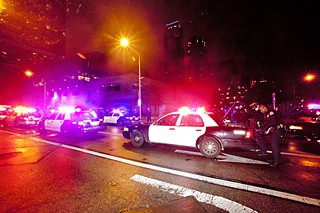Point Austin: Big Numbers
A thumbnail look at the proposed 2012-13 city budget
By Michael King, Fri., Aug. 24, 2012
City Council is awash in numbers at the moment. It's bond and budget time, so most of the numbers are dollar figures: increases and cuts, project costs, and of course tax rates. A prominent set occurs – as required by state law – on the cover page of the proposed 2012-13 budget: "This budget will raise more total property taxes than last year's budget by $35,006,714 or 9.1%, and of that amount $14,569,734 is tax revenue to be raised from new property added to the tax roll this year. The amounts above are based on the City's proposed fiscal year 2012-13 tax rate of 50.29 cents per $100 of assessed valuation. The City's fiscal year 2011-12 tax rate (the current tax rate) is 48.11 cents per $100 of assessed valuation."
(The cover also features a striking John Rogers* photo of the Long Center and an Art Cow – ingeniously sliced up by musical instruments, not city departments.)
That brief bit of required boilerplate reveals quite a bit, about not only current Austin economic circumstances, but also the politics of budgets. Just the state requirement highlights the burdens the Legislature imposes on cities that it never requires of itself – years after the state franchise tax was adopted, the comptroller is still trying to figure out how it works. Significantly, less than half of Austin's new revenues will be raised by the proposed property tax increase; the rest comes from burgeoning sales tax receipts as well as rising property values – i.e., Austin's perennial avatar, the double-edged sword of continued urban growth. And though it doesn't say so here (that comes later in the budget documents), the proposed tax rate, to be finalized by council in the next couple of weeks, is less than the "roll-back rate" – that is, the increase that would trigger (under state law again) a roll-back election.
The News staff will be taking a closer look at the proposed general funds budget next week, and, prepping for that effort, I thought it would be helpful to call attention in advance to a few of the most prominent numbers under discussion.
All In and Operating Out
The "All Funds" budget (including every kind of revenue collected in some way by the city's agencies) is pegged at $3.1 billion. As it happens, the most discussed number – property taxes – provides only 14% of that revenue; together with sales and other taxes (collected and distributed by the state), the total still only comes to 21%. Fully 57% ($1.8 billion) of the city's income comes from utility charges (most of which stay in utility operations), the rest from various fees, charges for services, and the like.
On the all-funds expenditure side, 51% is spent by Austin Energy and Austin Water, with much of the rest dedicated to ongoing services (including other "enterprise" departments like Austin-Bergstrom International Airport and the Convention Center). Overall, out of the total $3.1 billion, the city says it spends about one third on personnel, one third on contracted services, and one third on "commodities" (i.e., buying stuff). The city is a major employer, with more than 12,000 workers (12,281 "full-time equivalents").
Public Safety, Etc.
The smaller "General Funds" budget is really what council is beating its collective head over this month, and at roughly 21% of All Funds – for 2012-13, about $742.5 million – it is somewhat simpler and more comprehensible: 42% of the revenue derives from property taxes, 22% from sales taxes, 19% from "utility transfers" (revenue that, if privatized, would go to "shareholders," and the indirect focus of the political battle over Austin Energy rates), and 17% "other" – a category that includes franchise fees, building and development fees, and miscellaneous (e.g., parking fees and traffic fines). In addition to the property tax discussion, we can expect the annual public debate concerning whether "other" should be larger – that is, whether growth can literally be made to "pay for itself."
Finally, we come to expenditures of that $742.5 million. Most of the categories are predictable and (proportionately) small: 6.4% for public health, 6.9% for parks and recreation, 4.1% for libraries, a catch-all category of "transfers and other" at 13.1%. The imposing percentage, as always, remains public safety – police, fire, and EMS – which remains the city's most basic responsibility, is always at the top of citizen surveys of public priorities, and comes in at a whopping 64.2% – approaching two-thirds of our total spending.
The annual arguments over that particular spending have, to a degree, already been settled for 2012-13, via an earlier council decision to maintain the "2.0 officers per thousand residents" standard and hire 22 additional police officers (and 47 over the last fiscal year). Still, we can hope that Council Member Bill Spelman makes his projected return to the dais next week and points out that there may be more effective ways to spend that kind of public safety money – more safety bang for the police buck, as it were.
Eventually somebody will listen.
That's a snapshot of the big dollars involved in the city of Austin's proposed budgeting decisions for 2012-13. Next week we'll take a closer look at the departmental numbers, with a specific focus on where significant changes are likely, and what issues council and the public will need to consider as the budget moves forward.
Follow @PointAustin on Twitter.
*Long Center photo by John Rogers of John R Rogers photography
Got something to say on the subject? Send a letter to the editor.













